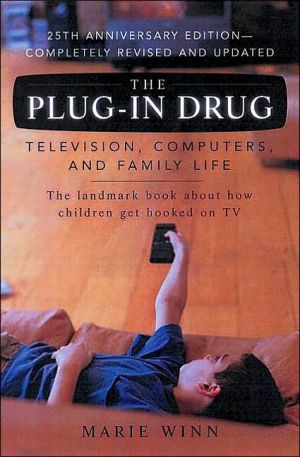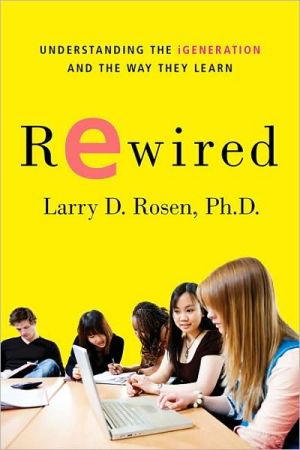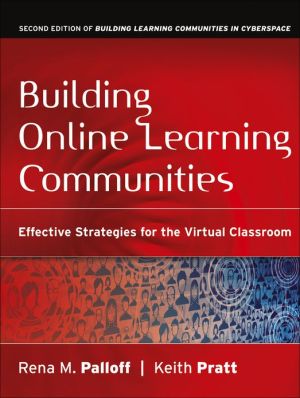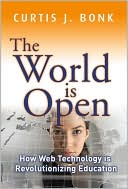Plug-in Drug: Television, Computers, and Family Life
How does the passive act of watching television and other electronic media-regardless of their content-affect a developing child's relationship to the real world? Focusing on this crucial question, Marie Winn takes a compelling look at television's impact on children and the family. Winn's classic study has been extensively updated to address the new media landscape, including new sections on: computers, video games, the VCR, the V-Chip and other control devices, TV programming for babies,...
Search in google:
This is the new edition of a book criticizing the effects of television on children, their schooling, and family relationships. The author argues that pretty much nothing has changed since the book was first published in 1977. Expanding her analysis to other electronic media, she suggests that many of the same problems are associated with the use of other electronic media. In chapters new to this edition, she discusses computers in the classrooms; video games, VCRS, and other electronic playthings. Annotation c. Book News, Inc., Portland, OR Library Journal After 25 years, Winn (Children Without Childhood) has completely revised and updated her landmark study of the influence of television on children and family life by incorporating findings based on recent research and investigating the impact of the home computer, the VCR, and the video game terminal. She has also shifted the focus from the TV programs children watch to the negative effects of television on children's play, imagination, and school achievement. Although Winn pinpoints many key shortcomings of television, this study is not argumentative; Winn instead aims to stress the quality of family life without television, to show educators and parents how to control the medium, and to offer practical suggestions on how to improve family life not dependent on television. This refreshingly candid and inviting study is highly recommended for both public and academic libraries. Leroy Hommerding, Fort Myers Beach P.L. Dist., FL Copyright 2002 Cahners Business Information.
PrefaceixThe Good-Enough FamilyNote about the Twenty-fifth Anniversary EditionPart I.The Television Experience1.It's Not What You Watch3The ConcernsAbout the Contents and Susceptible KidsWhat Does Not HappenWhy Do Parents Focus on Content?Television SavantsA Strange and Wonderful Quiet2.A Changed State of Consciousness16Television ZombiesThe Shutdown MechanismConcentration or Stupor?PassivityThe Reentry Syndrome3.The Power of the Medium26Why Is It So Hard to Stop Watching?Why It Captures the ChildCookies or Heroin?4.The Experts39Dr. Spock and the TubeThe Medical EstablishmentPhysical Effects5.Television and Violence: A Different Approach45First a DisclaimerLooking for a LinkMaking the Wrong ConnectionPart II.Television and Early Childhood6.Television for Tots55Baby ViewersSesame Street RevisitedThe Echoes of Sesame StreetHow Much Do They Understand?7.Television and the Brain67Brain ChangesCritical Early ExperienceA CaveatNonverbal ThinkingBrain HemispheresA Commitment to Language8.Television and Play78Less PlayThe Meaning of PlayAn Experiment of NaturePlay DeprivationPart III.Television and the School Years9.A Defense of Reading91What Happens When You ReadLosing the ThreadThe Basic Building BlocksA Preference for WatchingHome AttitudesLazy ReadersNonbooksWhat about Harry Potter?Radio and ReadingIf You Can't Beat 'Em, Join 'EmWhy Books?10.Television and School108A Negative RelationshipA Stepping Stone out of a Stumbling Block (Media Literacy)Television for HomeworkCommercials in the ClassroomA Primary FactorPart IV.How Parents Use Television11.Before Television121The Bad Old DaysA New Light on ChildhoodHow Modern Parents Survived Before TelevisionFinally It "Took"12.Free Time and Resourcefulness131No Free TimeAttachment and SeparationWhy Kids Can't Amuse Themselves"Nothing to Do"Competing with TVThe Half-Busy SyndromeWaiting on ChildrenSickness as a Special EventBack to the Past13.Family Life152The Quality of LifeFamily RitualsReal PeopleUndermining the FamilyPart V.New Technologies14.Computers in the Classroom165Do They Help?Big BucksComputers in Early ChildhoodWhy Computers Are Not the AnswerWhat Are They Replacing?The Computer-Television ConnectionNot Making the ConnectionWhy Not Get Rid of Them?The Problems of Bucking the TideComputers to Enhance ReadingComputer vs. WorkbookOn the High School and College FrontA Matter of Balance15.Home Electronics186The VCRA Wonderful Addition to the FamilyLapwareComputer ToysVideo GamesComputer GamesScreen TimePart VI.Controlling Television16.Out of Control201How Parents Get HookedA Terrible SagaUndisciplined, Grumpy ChildrenTen Reasons Why Parents Can't Control TVUbiquityA Chilling EpisodeA Longing for Passivity17.Gaining Control223Real ConvictionFirm RulesControl Devices and the V-ChipNatural ControlDecontrol as a Means of ControlHelp from the OutsideVideoholics AnonymousPart VII.No Television18.TV Turnoffs243Three Family Before-and-After ExperimentsOrganized TV TurnoffsWhy Did They Go Back?19.No-TV Families265Getting Rid of Television: Four Families That Did ItNo Television EverCODA: The Television Generation281Who Is the Television Generation?Mystery of the Declining SATsMaking InferencesWriting Is Book TalkTelevision and the Social ChillWhat Is to be Done?The Passive PullHelpful Organizations301Brief Bibliography303Endnotes305Acknowledgments324Index327
\ Library JournalAfter 25 years, Winn (Children Without Childhood) has completely revised and updated her landmark study of the influence of television on children and family life by incorporating findings based on recent research and investigating the impact of the home computer, the VCR, and the video game terminal. She has also shifted the focus from the TV programs children watch to the negative effects of television on children's play, imagination, and school achievement. Although Winn pinpoints many key shortcomings of television, this study is not argumentative; Winn instead aims to stress the quality of family life without television, to show educators and parents how to control the medium, and to offer practical suggestions on how to improve family life not dependent on television. This refreshingly candid and inviting study is highly recommended for both public and academic libraries. Leroy Hommerding, Fort Myers Beach P.L. Dist., FL Copyright 2002 Cahners Business Information.\ \ \ \ \ BooknewsThis is the new edition of a book criticizing the effects of television on children, their schooling, and family relationships. The author argues that pretty much nothing has changed since the book was first published in 1977. Expanding her analysis to other electronic media, she suggests that many of the same problems are associated with the use of other electronic media. In chapters new to this edition, she discusses computers in the classrooms; video games, VCRS, and other electronic playthings. Annotation c. Book News, Inc., Portland, OR (booknews.com)\ \








